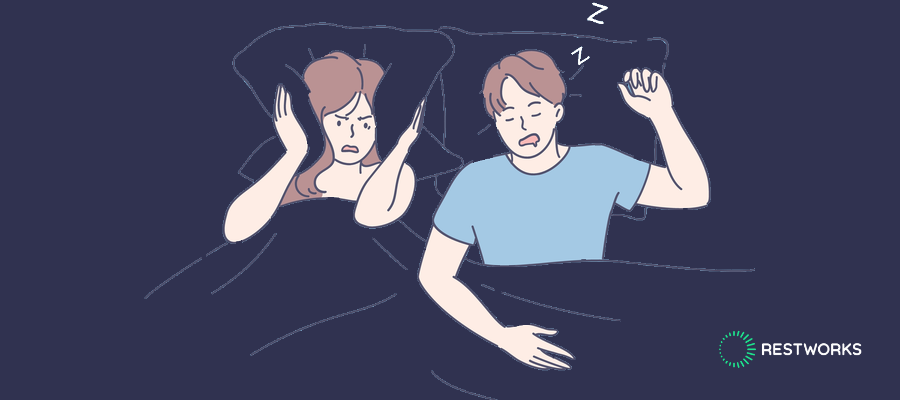Why do People Snore while Sleeping?
Snoring is the noisy breathing that happens when air passes through the relaxed tissues in your throat, causing them to vibrate and in turn causing snoring sounds.
Almost all people snore occasionally but for some, it is a chronic problem. Snoring can also be an indication of a serious health condition, requiring medical intervention. Lifestyle changes may be the best answer on how to stop snoring. Losing weight, avoiding alcohol a few hours before bedtime and sleeping on your side are a few things you can try before seeking medical intervention or turning to dubious anti snoring devices.
READ ALSO: WHAT TEMPERATURE SHOULD A BEDROOM BE?
Common causes of snoring
Snoring can be caused by many different factors. You may be able to control some of these factors, such as alcohol consumption and weight. Other snoring causes may be out of your control, such as the anatomy of your mouth and sinuses. Additional reasons why do people snore while sleeping may include:
Age
As you age, your muscle tone decreases, you may put on extra weight due to hormonal changes and your throat might narrow.
Being overweight and/or out of shape
Fatty tissue and poor muscle tone can contribute to snoring. Men with neck circumferences over 17” and women with neck circumferences over 16” may also suffer from snoring due to the extra weight around the neck.
Your build
A narrow throat, a cleft palate, and enlarged adenoids are some of the physical attributes that might be hereditary and lead to snoring. Men are more likely than women to have narrow airways and are more likely to snore.
Nasal stuffiness and sinus problems
A stuffy nose can make it difficult to breathe which can make a person breathe through their mouth rather than their nose.
Alcohol, smoking and medications
Any substance that works to relax muscles can contribute to snoring.
Sleep posture
Sleeping on your back can cause your throat to relax and/or your tongue to block your airway. Elevating your head by 4 inches or sleeping on your side might be enough to stop snoring.

Health consequences of snoring
Snoring is very common. In fact, according to John Hopkins Medicine, as much as 45% of adults snore. In most cases – of what is called normal snoring – this has little consequences. However, excessive snoring may be connected to one or more of the following symptoms:
- Excessive daytime sleepiness
- Morning headaches
- Sore throat upon waking
- High blood pressure
- Restless sleep
- Weight gain
- Awakening in the morning unrefreshed
- Awakening at night feeling confused
- Difficulty with memory, concentration or paying attention
Complications from snoring
Normal snoring does not necessarily interfere with the quality of your sleep. However, if you wake feeling unrefreshed or experience extreme fatigue and sleepiness during the day, you may suffer from a more serious sleep disorder. If you or your bed partner notice any of the following, call your doctor to discuss a sleep study to determine the extent of your sleep disruptions and possible treatment options:
- You snore very loudly and are tired during the day.
- You stop breathing, gasp or choke during sleep.
- You fall asleep at inappropriate times – such as during a meal or anytime you are seated for a length of time.
How to stop your partner from snoring
If you or your partner snore only occasionally or mildly and wake feeling refreshed and able to function well during the day, you can try to remedy your snoring with the following behavioral changes:
- Lose weight
- Avoid tranquilizers, sleeping pills and antihistamines before bedtime
- Avoid alcohol and heavy meals or snacks for at least 3-4 hours before bedtime
- Sleep on the side, not the back
- Clear nasal passages – a neti pot (device for nasal irrigation), nasal decongestant or can help breathe easier while sleeping.
Summary
Snoring is a common condition which in some cases can lead to sleep deprivation and overall lower quality of life. While there are different snoring aids available, there is usually no way to stop snoring immediately. In most cases, the best way to stop excessive snoring will involve some lifestyle changes, such as weight loss or reduced alcohol intake. If you feel that snoring seriously disrupts the sleep of you or your partner, consider seeking medical attention.


